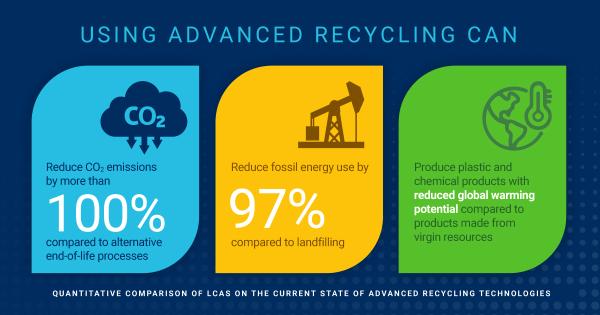
The City College of New York Grove School of Engineering today released a new report which examined advanced recycling. The report concluded that advanced recycling helps avoid climate impacts, reduces demand for energy resources, and offers key tools for expanding the circular economy. The report was authored by Dr. Marco J. Castaldi, professor of chemical engineering and director of CCNY’s Earth Engineering Center (EEC), and EEC research associate Lauren Creadore.
The authors examined 13 recently completed life cycle assessments (LCAs) and found that advanced recycling can transform hard-to-recycle plastics into products with a smaller carbon footprint than those made from new resources. The processes also reduce energy use and greenhouse gas emissions compared to conventional end of life methods, such as landfilling and waste-to-energy. Use of advanced recycling contributed to circularity for plastics in all 13 LCAs.
Specifically, the report found that advanced recycling technologies can:
- Produce plastic and chemical products with a reduced global warming potential compared to products made from virgin resources.
- Reduce the need for fossil energy resources by up to 97% compared to landfilling.
- Reduce CO2 equivalent emissions by more than 100% compared to typical end-of-life processes when accounting for displaced demand for chemical products and energy.
“As advanced recycling becomes increasingly efficient, it is poised to play a major role in achieving global sustainability goals,” said Castaldi. “It can transform hard-to-recycle plastics into a multitude of high-value feedstocks, reducing the need for fossil resources and limiting the environmental impact of waste management. Equally important, the data suggest that our transition to a more circular economy will dramatically improve climate outcomes.”
“There’s been significant investment and interest from companies and policymakers in advanced recycling,” said Bob Hall at the American Society of Mechanical Engineers’ Research Committee on Energy, Environment, and Waste. “Scientific studies like this one from CCNY, coupled with engineering ingenuity can help inform and responsibly move us towards a more sustainable and circular future. As these technologies mature, it is imperative to conduct additional studies on advanced recycling that adhere to international LCA standards.”
“ASME suggests that technologies that have current operating performance data and have a facility to visit should be given priority for future analyses,” added Annette Scotto, ASME Chair of the Material and Energy Recovery Division.
The report is titled “Quantitative Comparison of LCAs on the Current State of Advanced Recycling Technologies.” Click here to read it in its entirety.
About the City College of New York
Since 1847, The City College of New York has provided a high-quality and affordable education to generations of New Yorkers in a wide variety of disciplines. CCNY embraces its position at the forefront of social change. It is ranked #1 by the Harvard-based Opportunity Insights out of 369 selective public colleges in the United States on the overall mobility index. This measure reflects both access and outcomes, representing the likelihood that a student at CCNY can move up two or more income quintiles. Education research organization DegreeChoices ranks CCNY #3 nationally for social mobility. In addition, the Center for World University Rankings places CCNY in the top 1.8% of universities worldwide in terms of academic excellence.
Labor analytics firm Emsi puts at $1.9 billion CCNY’s annual economic impact on the regional economy (5 boroughs and 5 adjacent counties) and quantifies the “for dollar” return on investment to students, taxpayers and society. At City College, more than 15,000 students pursue undergraduate and graduate degrees in eight schools and divisions, driven by significant funded research, creativity and scholarship. This year, CCNY launched its most expansive fundraising campaign, ever. The campaign, titled “Doing Remarkable Things Together” seeks to bring the College’s Foundation to more than $1 billion in total assets in support of the College mission. CCNY is as diverse, dynamic and visionary as New York City itself.
Author
Jay Mwamba
Source
CCNY, press release, 2022-10-12.
Supplier
Share
Renewable Carbon News – Daily Newsletter
Subscribe to our daily email newsletter – the world's leading newsletter on renewable materials and chemicals










